

This is the ultimate guide to creating a study plan. Use this guide to get organized and maximize your potential!
This post may contain affiliate links, which means I’ll receive a commission if you purchase through my link, at no extra cost to you. Please read full disclosure here.
As an Amazon Affiliate I earn from qualifying purchases.
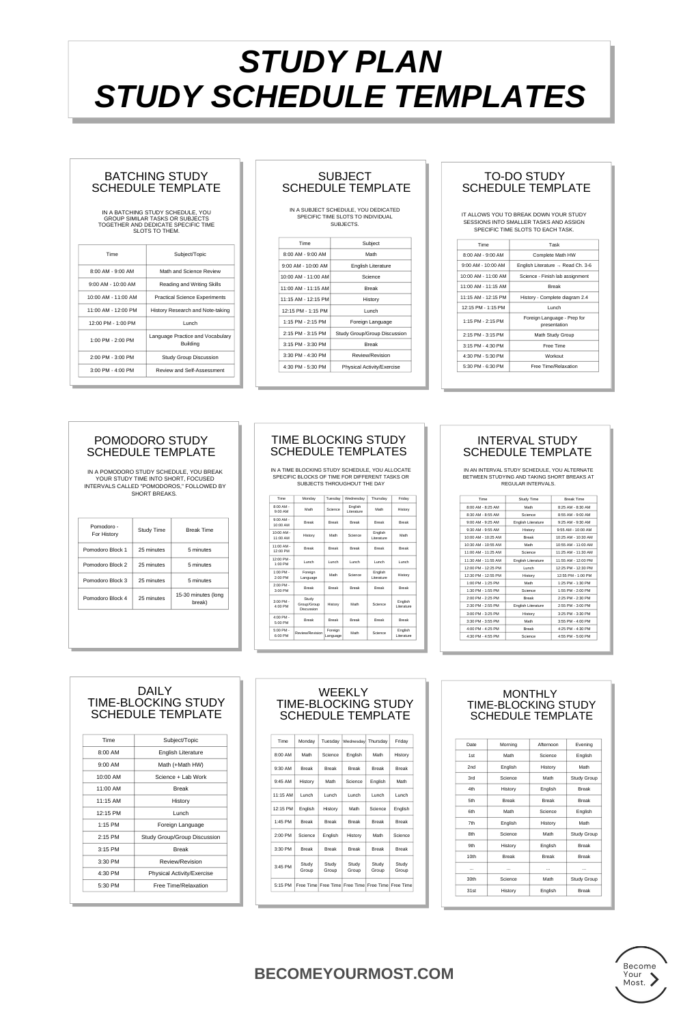
A well-structured study plan can help you stay organized, manage your time efficiently, and maximize your learning potential.
Having a study plan provides several benefits:
Overall, a study plan provides direction, organization, and structure to your learning journey. It empowers you to make efficient use of your time, enhance your understanding, and achieve your academic goals. By following a well-designed study plan, you can approach your studies with confidence and increase your chances of success.

Having a study schedule is important for several reasons:
Overall, having a study schedule is crucial for effective time management, organization, and goal achievement. It helps you make the most of your study sessions, enhances your learning experience, and increases your chances of academic success.
 with M2 chip, Liquid Retina XDR Display, 128GB, Wi-Fi 6E, 12MP front/12MP and 10MP Back Cameras, Face ID, All-Day Battery Life Space Gray" width="500" height="500" />
with M2 chip, Liquid Retina XDR Display, 128GB, Wi-Fi 6E, 12MP front/12MP and 10MP Back Cameras, Face ID, All-Day Battery Life Space Gray" width="500" height="500" />
Before diving into creating a study plan, it’s important to define your goals.
Take some time to evaluate your current study habits and schedule. Understand how you currently allocate your time for studying and identify any areas of improvement.
Reflect on what study methods work best for you and what times of the day you are most productive.
Once you have a clear understanding of your goals and current study habits, it’s time to prioritize and organize your study materials. Break down the topics or subjects you need to cover and prioritize them based on importance and difficulty level. Create a study schedule that allocates sufficient time for each subject while considering your energy levels throughout the day.
Avoid overwhelming yourself by breaking down your study sessions into smaller, manageable tasks. Set specific study goals for each session and track your progress. Celebrate the completion of each task, as it will motivate you to continue with the rest of your study plan.
Experiment with different study techniques to find what works best for you. Some effective techniques include active learning, summarizing information in your own words, using mnemonic devices, and practicing with past exams or sample questions. Incorporate these techniques into your study plan to enhance your understanding and retention of the material.
By following these steps, you can create a personalized study plan that suits your learning style and helps you achieve your academic goals. Remember to stay disciplined, stay motivated, and make the most out of your study sessions.

When creating a study schedule, it’s important to consider how to break it down either by workload or time:
Breaking down your study schedule by workload involves grouping similar tasks or subjects and dedicating specific time slots to them. This approach allows you to focus on related topics and optimize your study sessions.
Breaking down your study schedule by time involves allocating specific blocks of time for different tasks or subjects throughout the day. This helps you stay organized, manage your time effectively, and ensure that you cover all the necessary material.
Whether you choose to break down your study schedule by workload or time, the key is to find a method that works best for you and allows you to stay focused, motivated, and productive during your study sessions.
These are different types of study schedules that you can try to find the one that works best for you. Experiment with these approaches, customize them according to your preferences and needs and see which one helps you stay focused, motivated, and productive during your study sessions.
 with M2 chip: 15.3-inch Liquid Retina Display, 8GB Unified Memory, 256GB SSD Storage, 1080p FaceTime HD Camera, Touch ID. Works with iPhone/iPad; Silver" width="500" height="500" />
with M2 chip: 15.3-inch Liquid Retina Display, 8GB Unified Memory, 256GB SSD Storage, 1080p FaceTime HD Camera, Touch ID. Works with iPhone/iPad; Silver" width="500" height="500" />
In a batching study schedule, you group similar tasks or subjects together and dedicate specific time slots to them.
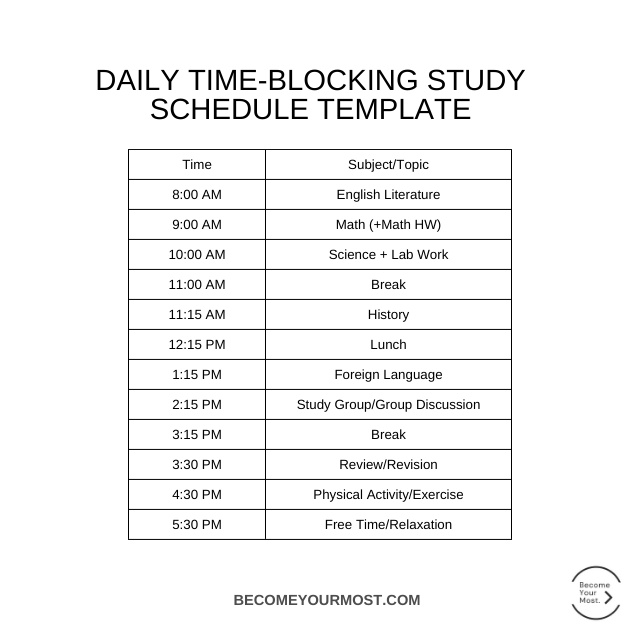
In a subject schedule, you dedicate specific time slots to individual subjects. Here’s an example:
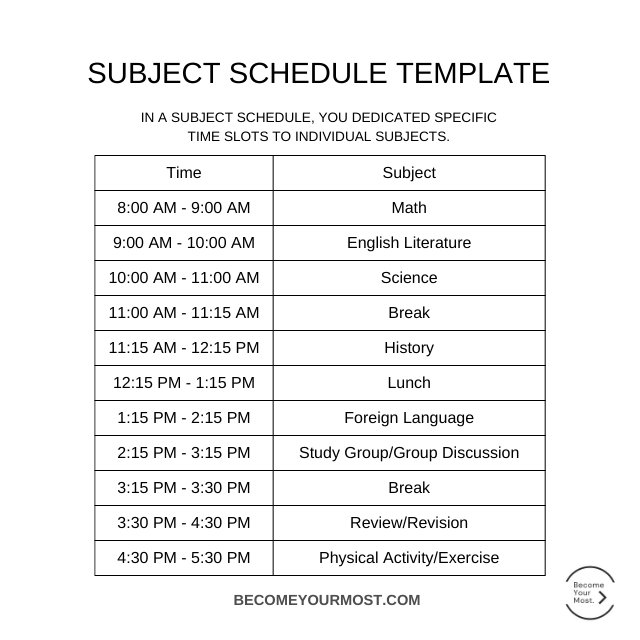
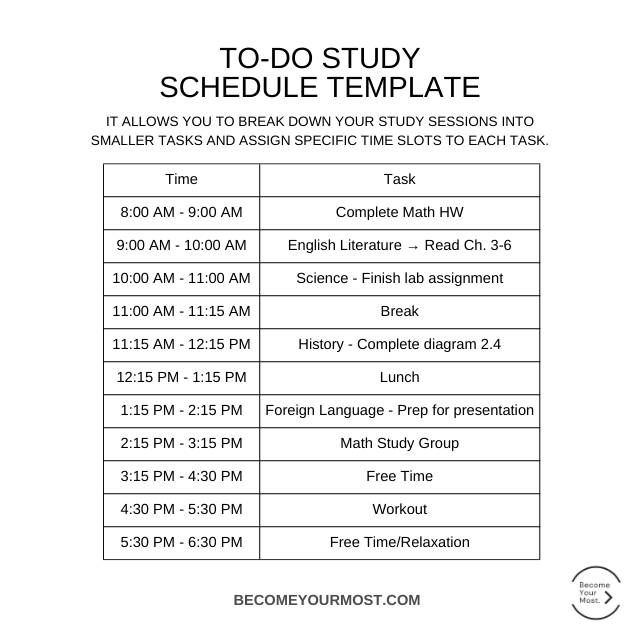
In a Pomodoro study schedule, you break your study time into short, focused intervals called “Pomodoros,” followed by short breaks. Here’s an example:

Repeat this cycle throughout your study session. Adjust the number of Pomodoros and break durations according to your preference and productivity level.
Remember to stay focused and take regular breaks to maintain productivity and avoid burnout.

In a time-blocking study schedule, you allocate specific blocks of time for different tasks or subjects throughout the day. This template provides a general structure that you can customize according to your specific needs:

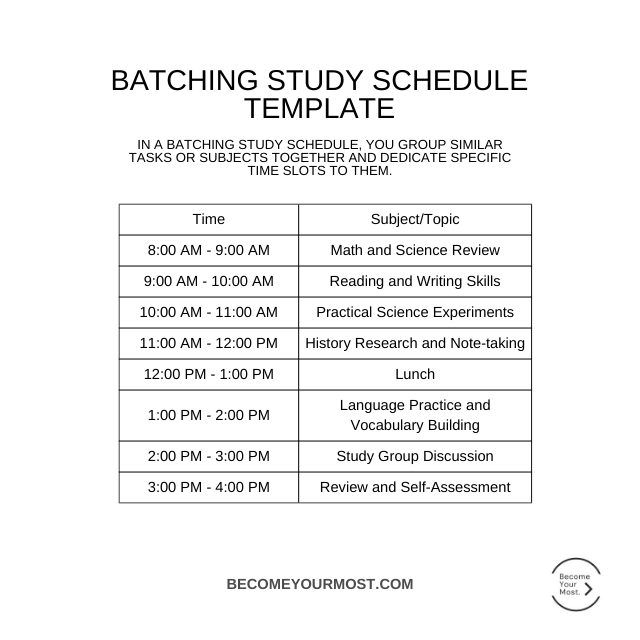
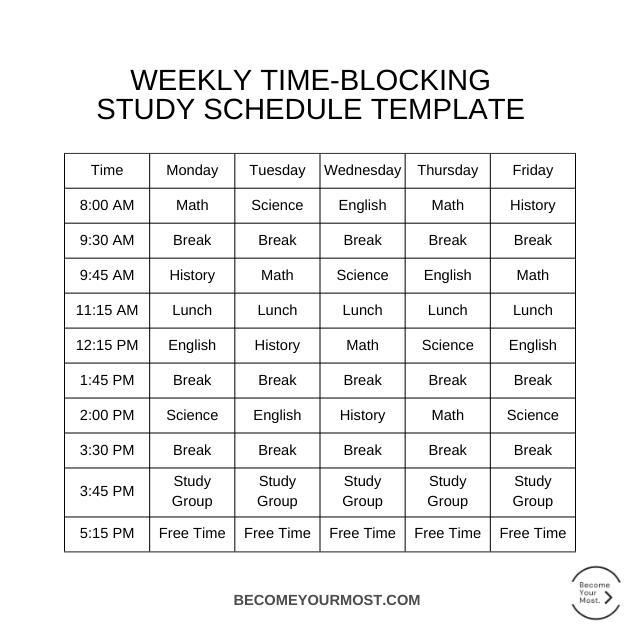
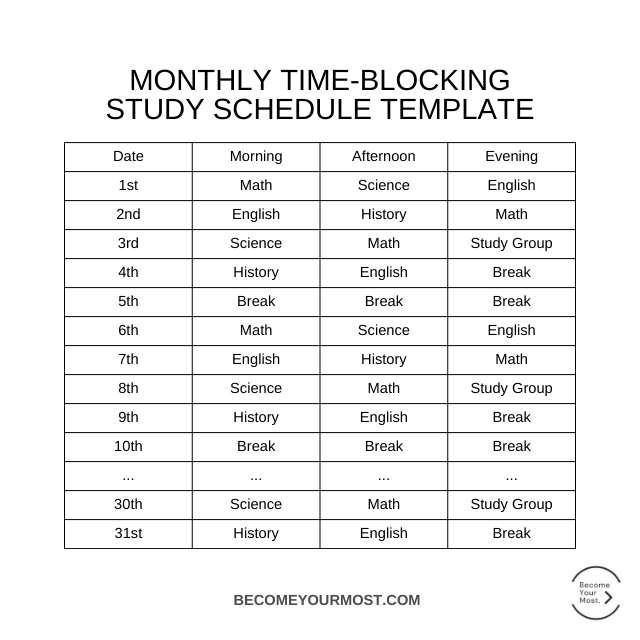
In an interval study schedule, you alternate between studying and taking short breaks at regular intervals. Here’s an example:

Repeat this cycle throughout your study session, adjusting the study and break durations according to your preference and productivity level.
Remember to stay focused during study time and take regular breaks to maintain productivity and avoid burnout.
Regardless of the format you choose, time blocking helps you stay organized, establish a consistent study routine, and effectively manage your time.
It allows you to allocate dedicated time for each subject or task, ensuring that you cover all the necessary material and make progress toward your study goals.
By following a well-structured time-blocking schedule, you can enhance your learning experience, reduce stress, and increase your chances of academic success.
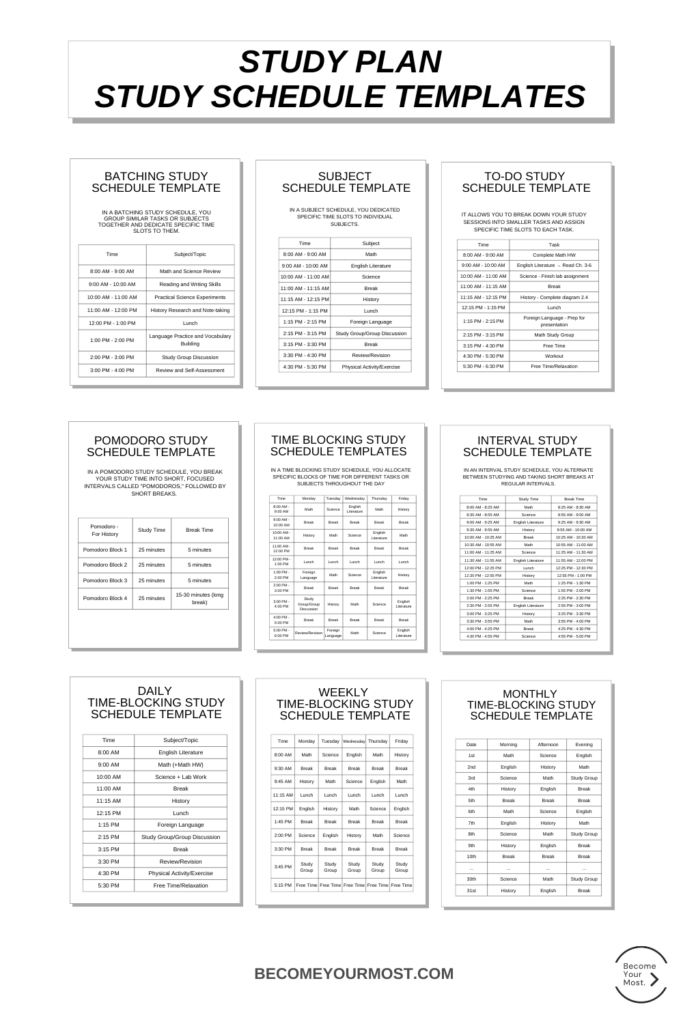
This post was all about the importance of creating a study plan and study schedule to enhance your learning experience and maximize your academic potential.
A well-structured study plan provides organization, time management, goal clarity, efficient learning, reduced stress, and progress tracking. It helps you stay focused, motivated, and accountable, ensuring that you cover all the necessary material and make continuous improvements.
Similarly, a study schedule allows for effective time management, consistency, habit formation, goal setting, efficient learning, reduced stress, and a balanced workload. It helps you establish a study routine, track your progress, and approach your learning in a structured manner.
By following the steps to create a study plan and study schedule, setting clear goals, assessing your current situation, prioritizing and organizing, breaking down tasks, using effective study techniques, and customizing the schedule to your preferences, you can optimize your study sessions and increase your chances of academic success.
Remember, a study plan and study schedule are flexible tools that can be tailored to your specific needs and learning style. Experiment with different approaches, find what works best for you, and stay disciplined and motivated throughout your academic journey.
So, start creating your study plan and study schedule today, and unlock your full learning potential!